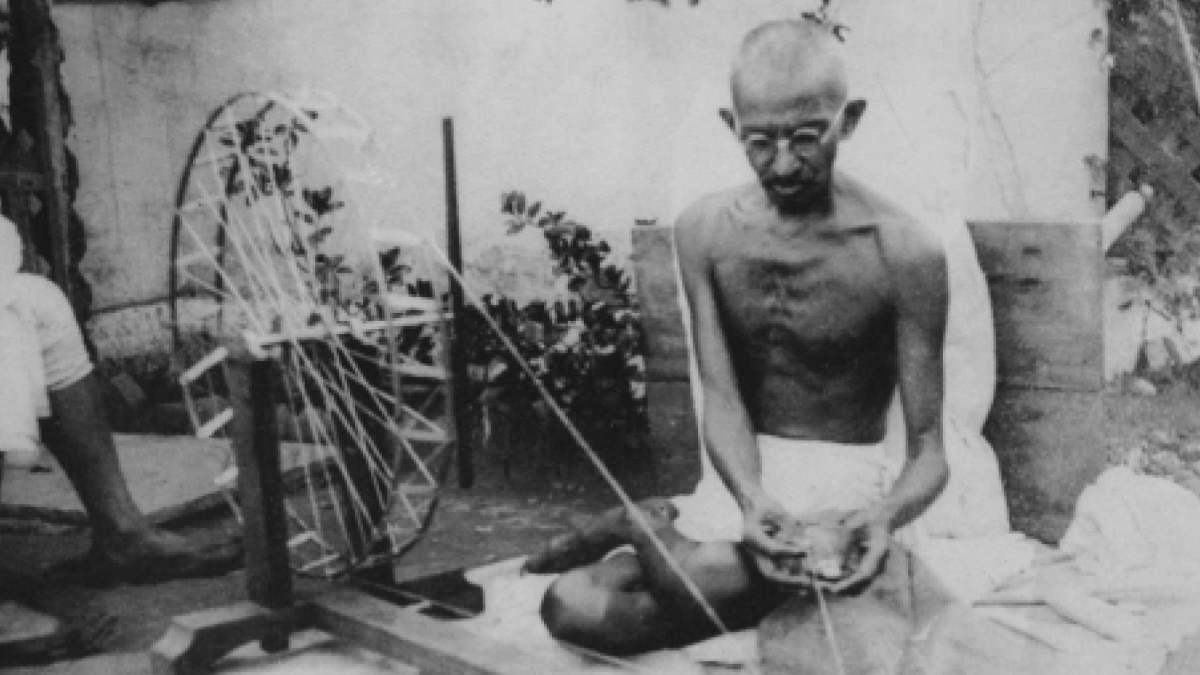
The notion of Swadeshi occupies a pivotal place in Mahatma Gandhi’s thought and practices. The centrality of the notion of Swadeshi can be gauged from the fact that Gandhi believed that the way to Swaraj is through the practice of Swadeshi. He argued that the prevalent poverty, injustice, corruption, inequality, and the poor education system, religious disquiet and various other evil practices in the society are due to the ‘ruinous’ departure from the path of Swadeshi. If we adopt Swadeshi not only in the economic, but also in the educational, religious and political arenas, we would be able to establish an equitable and just social order.
Gandhi does not use ‘Swadeshi’ in its literal sense, viz, “of one’s own country” alone. According to him, Swadeshi does not mean merely the use of what is produced in one’s own country. Though that meaning is certainly there. Swadeshi actually means reliance on our own strength. ‘Our strength’ means the strength of our body, our mind and our soul. So, swadeshi operates not only in the physical realm but it is also a spiritual principle. It represents the commitment of the self to rely upon the indigenous ideas to suit the local conditions, and to develop them, where they are found lacking. It is the underlying principle of Swaraj in ideas.
While negatively swadeshi means that the foreign goods should not be purchased at the peril of goods produced indigenously; positively it means that we should collectively apply ‘our brains to the production of things as a substitute for foreign materials’ or refining the indigenous goods and services. Swadeshi does not mean exclusion of everything foreign under every conceivable circumstance. According to Gandhi, “The broad definition of Swadeshi is the use of all home-made things to the exclusion of foreign things, in so far as such use is necessary for protection of home-industry, more especially those industries without which India’s esteem will be compromised and its economy pauperised”.
The principle of Swadeshi is akin to the golden rule of the Biblical teaching ‘Treat thy neighbour as thyself’. “Swadeshi” according to Gandhiji is “that spirit which dictates man to serve the next-door neighbour to the exclusion of any other”. It is “that spirit in us which restricts us to the use and service of our immediate surroundings to the exclusion of the more remote”. This definition implies that we must strive to improve religious, social, political, economic, environmental conditions of our own life, home, immediate family, neighbours, village, district, state, country and the world in that order.
The principle of Swadeshi is not based on narrow patriotism. Swadeshi like Gandhi’s inclusive patriotism “is calculated not to hurt any other nation, but to benefit all in the true sense of the word”. Because for Gandhi, “Patriotism is the same as humanity”. He says, “I am patriotic because I am human and humane”. Swadeshi is a nationalist humanitarian principle because it strives for the welfare of whole humanity. Only he who cares for his neighbour has the right to say: ‘All are a kin to me.’ Hence, a person who serves his distant neighbour at the cost of the service of his immediate neighbour, is neither a nationalist nor an internationalist.
Swadeshi is not a narrow principle as it does not forbid one to serve the distant neighbour. It only says, “I must not serve my distant neighbour at the expense of the nearest.” In fact, pure service of our neighbours can never, from its very nature, result in disservice to those who are far away, but rather the contrary. One who wishes to serve the whole of humanity to the best of his capacity cannot do so by neglecting his neighbours. One who claims to serve ‘whole of humanity’ does not end up even in serving his immediate neighbour — an individual person. This is so because ‘whole of humanity’ is a fantasy, a chimera, a mirage, whereas an individual is a concrete reality.
Swadeshi is not a punitive or revengeful vow, rather it is a religious duty. It is not a vrata that is aimed at harming anyone, including oneself. It is a principle which aims at the improvement and benefit of all. A Swadeshist has to voluntarily adhere to the principle of self-denial of refined goods at the cost of personal inconvenience and adopt the coarse and unrefined things till they are improved by developing better techniques of production and removing their shortcomings. It is self-inflicted sacrifice as one has to “learn to do without hundreds of things which today he considers necessary”. He has to make conscientious and persistent effort to improve the quality of goods produced in his country.
Let me conclude by saying that Swadeshi, as a global practice, will one day, improve the quality of goods and unite the whole world and make every nation self-reliant, aatmanirbhar.
The writer is former Professor of Philosophy, Delhi University, Delhi.